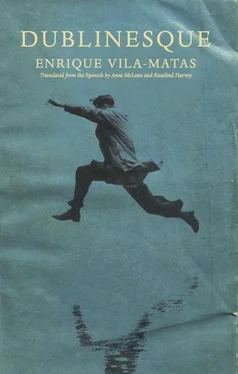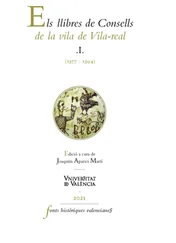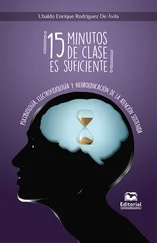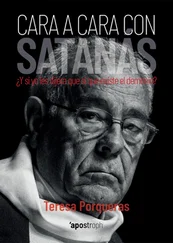What logic is there in things? None really. We’re the ones who look for links between one segment of our lives and another. But this attempt to give form to that which has none, to give form to chaos, is something only good writers know how to do successfully. Luckily, Riba’s still friends with a few, although it’s also true he’s had to organize this trip to Dublin in order not to lose them. In terms of friends and creativity, he’s been in a critical situation ever since he closed his business. Deep down he misses the continuous contact with writers, such strange, ludicrous beings, so self-centered and complicated, and such idiots, most of them. Ah, writers. Yes, it’s true he misses them, although they were such a pain. All so obsessive. But it can’t be denied they’ve always amused and entertained him a lot, above all when — here he smiles maliciously — he paid them lower advances than he could have afforded and contributed to their being ever poorer. Ungrateful wretches.
Now he needs them even more than he used to. He’d like one or two of them to think to call and invite him to a book launch, or a conference on the future of the book, or simply show a bit of interest in him. Last year several of them still took the trouble to call (Eduardo Lago, Rodrigo Fresán, Eduardo Mendoza), but this year no one has. He’ll be really careful never to beg one of them, it would be the last thing he’d ever do in his life. Beg to be allowed to take part in some launch, or yet another swansong for the book! But he thinks there are a lot of people who owe part of their success to him and might remember him for some event of this sort or for anything. Although it’s a well-known fact: writers are resentful, jealous to the point of sickness, always penniless, and finally a load of ungrateful wretches, whether they’re poor or completely poverty-stricken.
As he doesn’t drink anymore, there’s no danger of him turning into a blabbermouth and going around letting one of his secrets slip. The best-kept one of all is about how much he enjoyed feeling like a real bastard every time he bragged about the number of reduced advances he paid to novelists, who are by far the most unbearable — more than poets or essayists — when they become truly insufferable. Of course, if he reduced their advances it was because he thought that, as he wasn’t very gifted in financial matters, if he didn’t haggle and earn himself a reputation for being stingy, he would have been ruined even sooner. If he hadn’t put a stop to his alcohol consumption and his business, he undoubtedly would have been well on his way to ending up like Brendan Behan: totally impoverished and an eternal drunk. He thinks about this Irish writer and the New York bars he used to visit. And he thinks again that today, after so much banking activity, if it wasn’t for the fact he himself has prohibited it, he’d knock back a glass of the strongest liquor right now.
“ Strong liquors / like molten metal ,” said Rimbaud, probably his favorite writer.
It’s a suicidal impulse, but what can he do? His thirst is great and the shadow of temptation long. And long too this life that’s so brief.
Riba imagines that Nietzky actually has something of the fleeting spirit that accompanied him in his childhood of continuous sessions of soccer on the Aribau patio. Those early years, the shadow of the spirit was always with him, but he soon lost sight of it, and has only seen it again in that dream he had the day he arrived in New York for the first time. He imagines Nietzky is a kind of guardian angel, this angelo custode . And he also imagines that now he’s speaking to this sort of relative of that lost spirit and that he’s doing so in a joyous realm of white cricket trousers, tartan socks, binoculars slung over one’s shoulder, and English languages.
You should lead a more healthy life, says Nietzky, you should go for walks in the fresh air. I’d like to see you walking around your neighborhood, or else out in the countryside. Tire yourself out in the natural world. Or else try to have other goals, instead of devoting yourself to your computer, or spending all your time thinking now you’re old and washed-up, that you’ve become very boring. But do something. Action, action. I have nothing else to say.
It seems to him that thinking about Brendan Behan is a more than suitable way of preparing for his trip to Dublin. For a time — long ago now — this Irish writer was an enigma to him, a mystery from the moment Augusto Monterroso said in Journey to the Center of the Fable that “travel writing such as Brendan Behan’s New York is the greatest happiness.”
For a long time he asked himself who the hell this Behan could be, but without going so far as actually looking him up. And now he remembers that whenever he saw Monterroso, he forgot to ask him. And he remembers too that, one day, when he least expected it, he found the name of Brendan Behan in an article about famous guests of the Chelsea Hotel in New York. All it said was that he had been a brilliant Irish writer who used to describe himself as “a drinker with writing problems.”
This last was etched into his mind; at the same time, an intensity yet scarcity of information made the enigma of this drinking saint still greater, until one day, many years later, he discovered Behan camouflaged behind the character of the garrulous Barney Boyle at a bar in Christine Falls , a novel written by John Banville under his pseudonym Benjamin Black. Still surprised by this discovery, he devoted himself to spying on the environment of this Boyle, Behan’s counterpart: an atmosphere of fog, coal fires, whiskey vapors, and stale cigarette smoke. And he began to think that each day he found himself ever closer to the authentic Behan. He wasn’t wrong. A few weeks ago, he went into a bookshop, and as if it had been there waiting for him his whole life, he suddenly came across the Spanish edition of Brendan Behan’s New York . The first thing he regretted was not having published it himself. And he regretted it more when he discovered that Behan’s book was a wonderful monologue about the city of New York, which he considered “the greatest city on the face of God’s earth.” To Behan, nothing compared to the electric city of New York, the center of the universe. The rest was silence, glaring darkness. After having been in New York, everything else was awful. And so London, for instance, must seem to a Londoner returning from New York like “a wide flat pie of redbrick suburbs with the West End stuck in the middle like a currant.”
Brendan Behan’s New York , the book he wrote at the end of his life, turned out to be a tour of the infinite genius of a city’s human landscape, a city with a lucky star. What’s more, Behan’s New York confirmed that this city and happiness were the same thing. Behan wrote his book in the Chelsea Hotel, when he was already a total alcoholic, at the start of the sixties. They were days of great parties, where people were always dancing the recently invented twist and the Madison, but also days of incipient revolutions. Some years earlier, the Welshman Dylan Thomas had turned up at the Chelsea Hotel on the night of November 3, 1953, announcing he’d drunk eighteen straight whiskeys and thought this was probably a record (he died six days later).
Ten years later, as if he were the very same “drunken boat” from Rimbaud’s poem, “hurled by the hurricane into the birdless ether,” the Irishman Behan turned up at that hotel too in as inebriated a state as the Welshman had been; he was assisted by Stanley Bard, the owner of the Chelsea, who put him and his wife up, even though he knew that the writer, who was always drunk, had been thrown out of every other hotel. The great Stanley Bard knew that if there was one place where Behan might start writing again it was the Chelsea. And so it was. The hotel on 23rd Street, which had always been considered a place conducive to creativity, turned out to be crucial to Behan, whose book was composed on the same floor where Dylan Thomas had lived.
Читать дальше












